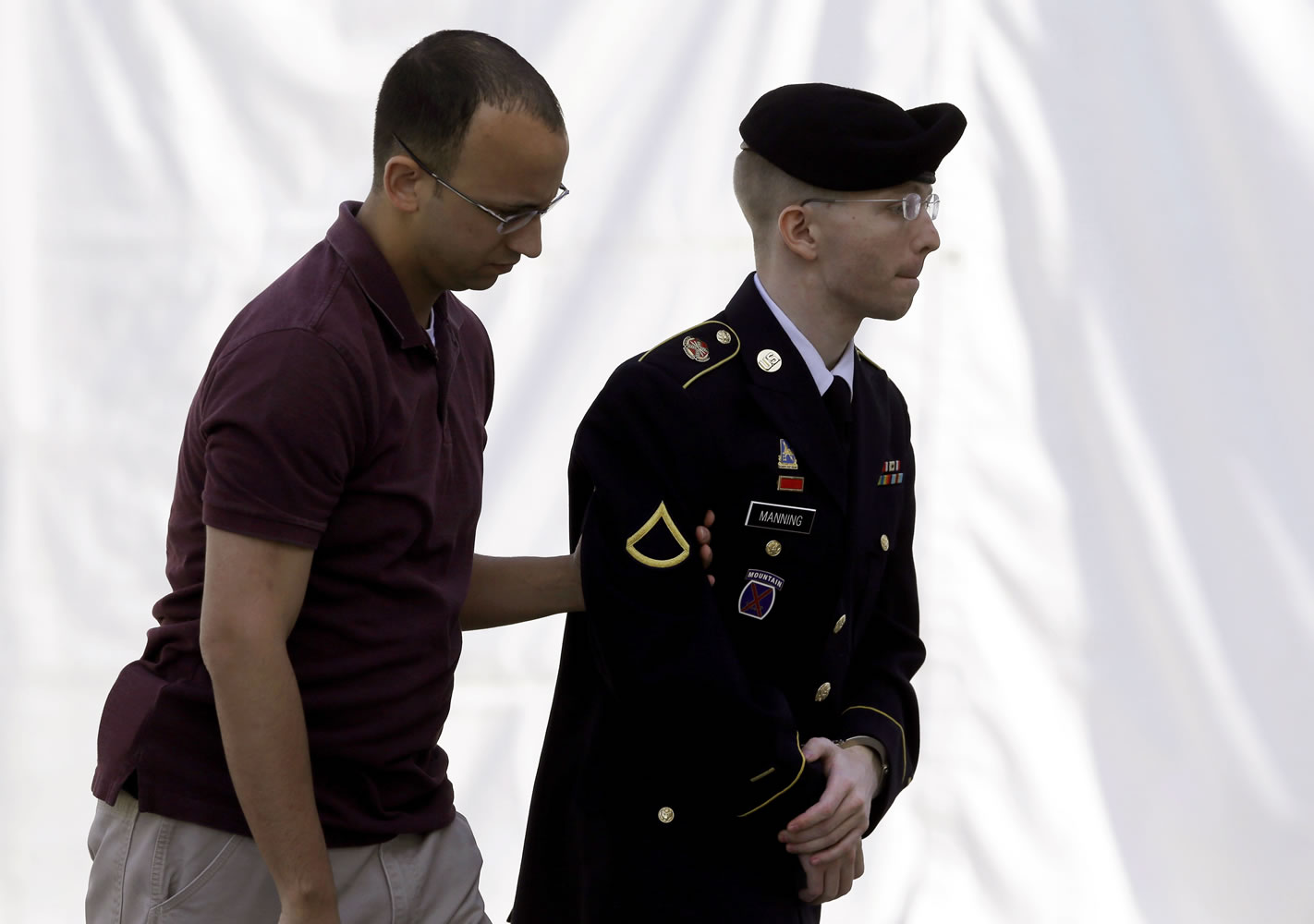FORT MEADE, Md. — Three days into Pfc. Bradley Manning’s court-martial over giving thousands of classified documents to WikiLeaks, the case against him is becoming clear: Prosecutors are calling witnesses who say Manning was trained to guard classified information and knew it could easily fall into enemy hands, yet he defied orders to keep it protected.
At each turn, Manning’s defense has sought to prove he never meant to harm his fellow soldiers or national security. They have also portrayed the soldiers who worked with some of the military’s most sensitive material as laid-back and unprofessional.
Manning is charged under federal espionage and computer fraud laws, but the most serious offense the military has accused him of is aiding the enemy, which carries a life sentence.
On Wednesday, Jihrleah Showman, an intelligence analyst who worked with Manning in Baghdad, testified soldiers who were looking at classified materials watched movies at work, played computer games and listened to music before a commander found out and ordered them to stop.
Showman, a witness for the prosecution, also said analysts had access to many kinds of information, but that didn’t mean they were allowed to look at all of it.
“It was your responsibility to look at things you needed,” she said. “Just because you had a secret clearance doesn’t mean you have legal access to see everything that has secret classification over it.”
Shortly before his arrest, Manning was disciplined for punching Showman in the face in what she has described as one of several violent outbursts both before and during their deployment. She did not testify about the punch but could be recalled later.
Manning, 25, has admitted turning over hundreds of thousands of classified documents. His lawyer has called him a “young, naive but good-intentioned” soldier, but prosecutors say he put secrets directly into the hands of Osama bin Laden.
His trial, which is being heard by a judge instead of a jury, is expected to run all summer.
On Tuesday, an instructor testified Manning was a serious, but pesky and inquisitive student who was ridiculed by classmates during advanced intelligence training in 2008 at Fort Huachuca, Ariz.
“At times, it was difficult to continue the lesson because he was always, ‘Why is that? What if?”‘ instructor Troy Moul said.
His unit supervisor, retired Sgt. 1st Class Brian Madrid, said Manning got in trouble for posting a YouTube video to family and friends in which he described what he was learning. Although the video revealed no classified information, Manning was trained to avoid disclosing any information about military intelligence online because it could be seen by militant Islamic insurgency groups, including al-Qaida.
As a corrective measure, Manning had to give a classroom presentation about operational security, Madrid said. When he asked Manning if he understood what he did wrong, “he said he understood it and it won’t happen again,” Madrid said.
The trial for the soldier from Crescent, Okla., has taken on a clandestine feel. Large parts of the proceedings were expected to be closed to the public. Many documents have been withheld or heavily redacted and photographers were blocked from getting a good shot of the soldier earlier this week.
The court-martial began Monday under a barrage of heavy restrictions, but the military has since relaxed some of the rules.
Manning supporters wearing “truth” T-shirts had to turn them inside out before entering the courtroom, but now they are allowed. Reporters covering the hearings were asked to sign a document saying they would withhold the names of spokespeople on-site because the military said some people directly involved in the case had received death threats. The Associated Press signed the document the first two days, but protested it. On Wednesday, an AP reporter and photographer crossed out the section pertaining to anonymity before signing it and were allowed to cover the trial.
The lack of public access to rulings and motions is being challenged in federal court by the Center for Constitutional Rights, WikiLeaks founder Julian Assange and a handful of journalists. Thirty news organizations, including the AP, plan to file a brief this week supporting the case.
Military law experts say some of it is common for a court-martial, while other restrictions appear tailored to the extraordinary nature of the case, which has garnered an outpouring of support for Manning from whistleblowers, activists and others around the world.
“I cannot remember a situation where there was such a high degree of civilian interest, people not affiliated with the military, having intense and passionate interest in the outcome of the case,” said David J.R. Frakt, a military law expert at the University of Pittsburgh School of Law and a former military prosecutor and defense lawyer.



